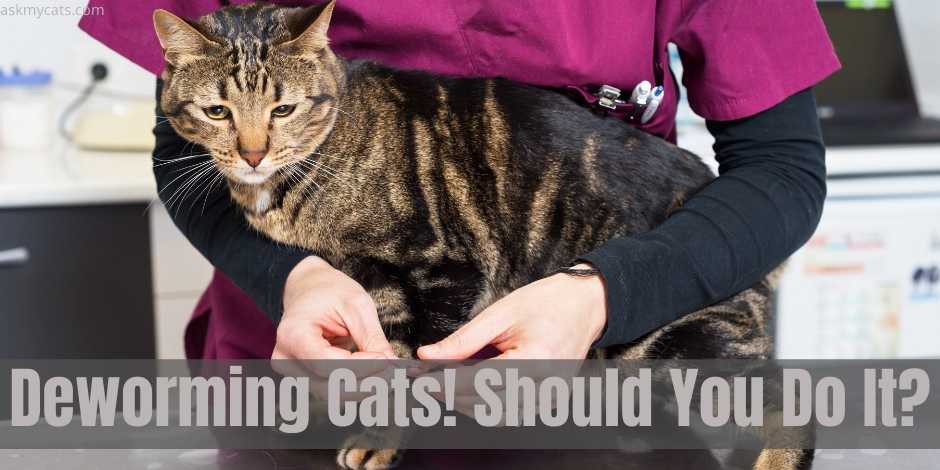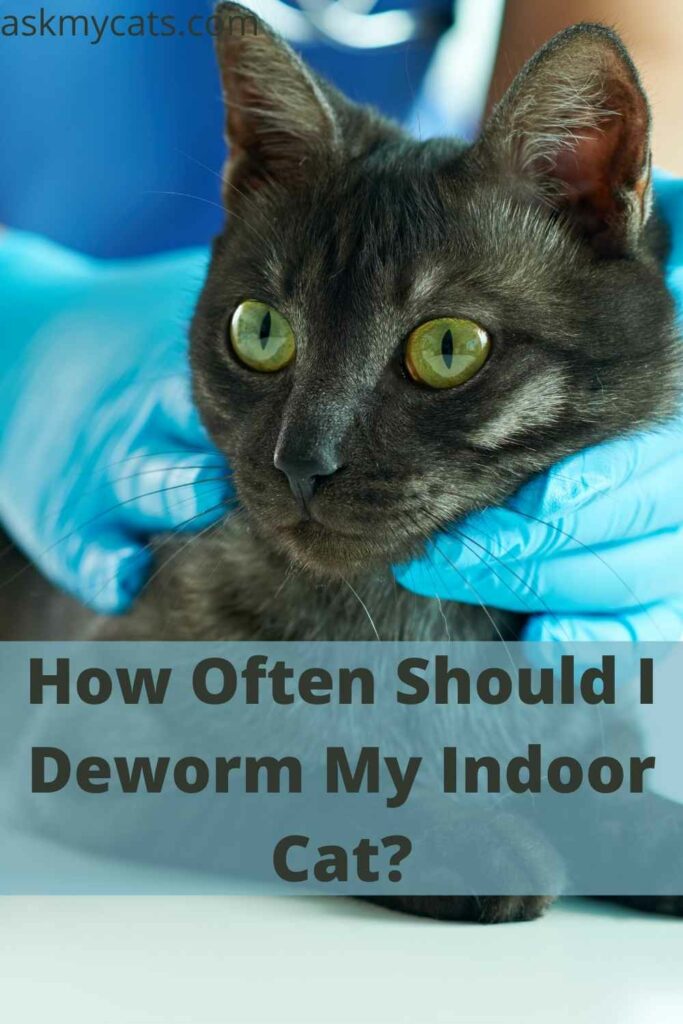None of us wants our cats to go through pain. However, many cats, throughout their lifetime, get worms. Your cat may experience growth degradation because of these worms.
Kittens tend to be more greatly affected by worms as compared to adult cats. However, it is safe to say that deworming is a must for your cat.
This article will help you better understand deworming and its effects on your cat.


Give Your Cat the Perfect Day
Get the Free Ebook!
How Much Does It Cost To Deworm A Cat?
The cost to deworm a cat varies based on the severity of the infection and the cat’s age with respect to which part of the world you are in.

Typical Costs
- For kittens: If you just bought a kitten, you’ll probably take them to the doctor for an initial check-up that includes a diagnostic exam, immunizations, and deworming, as most kittens pick up worms from their mother or other pets. The cost of an initial visit varies a lot. The prices ranged from $31 to $131 in a survey of veterinary practices across the United States.
- Treatment plan with the vet: A visit to the clinic guarantees that the type of worm your cat has is treated. Worms come in a variety of forms, from intestinal worms to heartworms to tapeworms. The cost of a basic veterinarian visit varies depending on where you reside, ranging from $15 to $50 in some places. Whether it’s an oral or topical treatment, the drug itself costs somewhere between $3 to $18.
- Tapeworms are the most easily detected of the worm types because the parasite appears in the feces of cats as little, sectioned, thin pieces that resemble tape, hence the name. Most tapeworm treatments, such as Tradewinds Tape Worm Tabs, which cost around 21 dollars, solely cure tapeworm.
Additional Costs
- To prevent your cat from reinfecting himself, you should remove the litter from his litter box and bleach it. A bottle of bleach costs less than $5, while litter costs roughly $10.
- Your veterinarian may offer a rehydration shot, often known as fluids or liquids if your cat’s worms have caused diarrhea or vomiting. This is likely to be given intravenously, and the cost varies based on the veterinarian, the cat’s weight, and the severity of its dehydration. A survey of veterinarians across the country revealed a price range of $15 to $48.
- Inquire with your veterinarian about a worm-prevention treatment plan. A low-dose medicine would be given once a month indefinitely. In online markets, medication is sold in quantity, with prices ranging from $33 to 63 dollars.
Should I Give My Cat Dewormer?
Yes, you should give your cat a dewormer to help prevent them from getting worms and get rid of worms if they have any.
Worms are parasites that can infect a kitten through the mother’s milk and an adult cat with flea eggs or other animals. The most common types of worms in cats are roundworms and tapeworms.
Because it can’t absorb all of the required nutrients from its food, an infected kitten may have growth retardation and immune system damage. Humans are also infected with worms. Deworming your cat is therefore critical.
Deworming Schedule
1. Kitten
If you’ve recently acquired a young kitten who has never been wormed, or if you don’t know if or when they were last wormed, you should treat them right away.
Then, until they’re eight weeks old, you should deworm them every two weeks. After that, you can worm them once a month until they’re six months old, then once every one to three months.
2. Adult Cats
Adult cats should be wormed at least once every three months, or four times a year, once for each season.
3. Pregnant Cats
These cats should be wormed when the pregnancy is complete and again during nursing with the kittens’ first worming treatment.
Check with your veterinarian before deworming to see which products are safe to use on pregnant or nursing cats.
4. Hunting Cats
Cats who enjoy hunting are much more likely to contract worms by eating infected rodents such as mice. As a result, your veterinarian is likely to recommend worming once a month.
You might also like to read about natural dewormer for cats
What Happens When You Deworm A Cat?
When you deworm a cat, the dewormers start attacking the worms which are infecting your cat. Each with its different method.
Cat worms are often treatable if detected, halted, and treated before the infestation progresses to the severe stages.
Depending on the parasite and the amount of the infestation, your veterinarian can prescribe the right deworming drug (anthelmintic) and administration regimen.
- Tapeworms: The drug breaks up tapeworms inside the intestinal tract, making them too small to see in the feces of cats with tapeworms.
- Roundworms: The drug detaches the worms from the intestinal tract and excretes them into and with the stool in cats with roundworms.
- Hookworms: The treatment only kills the adult hookworms in cats with hookworms. To treat the hookworms that were babies during the first treatment, experts propose another treatment in 2-4 weeks.
- Ringworm: Experts usually prescribe antifungal drugs, shampoos, lime-sulfur dips, and the shaving of badly afflicted regions for cats with ringworm.
You must read about what to expect after deworming a cat
Do Indoor Cats Need Deworming?
Yes, indoor cats need deworming. Your cat can catch worms even if they never leave the house. Regular worming treatments are therefore necessary to maintain your indoor cat healthy and free of worms.
Many cats are born to wander, but others spend their entire lives indoors.
You might question if you still need to be concerned about worms if your cat isn’t an outdoor explorer that enjoys capturing mice or mingling with other animals.
The answer is yes. Even cats who never go outside are susceptible to parasites such as tapeworms, roundworms, hookworms, lungworms, and heartworm.
How Often Should I Deworm My Indoor Cat?
You should deworm your indoor cat at least every three months, even if they spend their days indoors, to keep them healthy and free of worms.

Kittens and their mothers are the most vulnerable to intestinal parasite infection, and as a result, they are more likely to harbor worms and produce infective-stage larvae.
As a result, they require a more thorough deworming regimen than an adult cat.
According to the manufacturer’s recommendations, deworming kittens should begin at six weeks of age and be repeated at 8, 10, and 12 weeks of age.
Nursing dams should be treated at the same time. After that, kittens should be dewormed once a month until they reach the age of six months.
During the summer months, it is advised that adult cats have monthly dewormers in addition to their flea and heartworm prevention, as well as an annual fecal check.
It is also recommended that all outdoor cats be dewormed for tapeworms 1-2 times a year.
You must like to read about are worms in cats deadly
What Is The Easiest Way To Deworm A Cat?
There are many ways you can deworm your cats, like tablets, spot-on and paste, or granules.
1. Tablets
Worming tablets are by far the most popular form available and are usually given to cats straight or mixed into their diet.
2. Spot On
Spot-on wormers are applied to the cat’s neck around the skull base in the same manner that some flea treatments are.
3. Paste or Granule
While some people find this format more challenging to use than tablets or drops, it is another choice for pet owners, particularly those who like to mix worming treatments into their cat’s food.
What Happens If I Give My Cat Too Much Dewormer?
Giving your cat too much dewormer could do more damage than good and can even prove to be fatal. Symptoms include: –
- Drooling
- Blindness
- Difficulty in breathing
- Slow heartbeat
- Loss of appetite
- Vomiting
- Lethargy
- Seizures
- Depression
- Coma
Overdosing of dewormers must be avoided at any cost as it could create numerous problems for your cat.
Also, check out about my cat has worms how do i clean my house
Benefits Of Deworming Cats
The benefits of deworming your cat are that the medicine allows your cat to stay in good health and be protected from worms, thus maintaining their well-being.

According to one study, one out of every two cats is not dewormed and shows signs of intestinal illness.
This can have a significant impact on your cat’s health.
You can ensure your cat’s health and safeguard your household from contamination by using deworming treatment.
De-wormer is a medication given to cats to help them battle worms in their digestive tract.
De-worming your cat, in other words, lets you destroy parasites that have taken up residence in your cat’s stomach and intestines.
If their mother was not adequately de-wormed, kittens could be infected with worms from their birth.
It is critical to treat expectant mothers in order to prevent parasite transfer to the offspring.
Adult cats can also be infected with the parasites, putting them at risk of significant digestive disorders.
Cats can become infected by ingesting roundworms in lawns, sandpits, and muddy places when eating their prey. The sickness can also be spread by contact with contaminated materials.
You’ll know if your cat is sick, if they vomit and have bloody diarrhea, or if their stomach is enlarged. These parasites are easily identifiable because they resemble rice grains.
The worms will not have enough time to multiply and spread throughout your cat’s digestive system if you deworm him regularly. Taking care of your cat also means taking care of your family.
Children and the elderly are particularly vulnerable to this illness and can become infected very fast if they come into contact with the parasite.
Kittens should be dosed every two weeks until they reach the age of three months, then once a month until they reach the age of six months.
To achieve an effective result, the treatment must be repeated regularly. Adult cats should be dewormed two to four times a year. If you have more than one cat, treat them all at the same time to avoid cross-contamination.
However, before beginning any treatment, you should consult with your veterinarian. They will tell you which de-wormer to use and how much to use. The frequency varies depending on the size and weight of the cat in question.
When doses aren’t followed, saprophytic bacteria can be destroyed, which is an unintended consequence.
Remember to deworm your indoor cats, too, because, contrary to popular belief, cats who go outside aren’t the only ones who get worms.
You might find it interesting to know can i get worms from my cat sleeping in my bed
What Happens If A Cat Doesn’t Get dewormed?
If a cat doesn’t get dewormed, many complications would likely occur, from intestinal blockage to growth degradation and much more.
Most significantly, deworming your cat is necessary since an infestation can severely impact your cat’s health. Worms can be anything from an annoyance to a life-threatening condition.
Worms can cause health problems in kittens and cats who are medically impaired or frail as they age. They may develop anemia or get dehydrated as a result of vomiting and diarrhea.
Kittens can have so many worms that they cannot move them via their GI system, resulting in an intestinal blockage, which can be fatal. Infected kittens who are not dewormed may experience problems with growth and development.
Adult cats with worms rarely have serious health problems, but they are in danger to the point that they should be dewormed.
You might also like to read about should i quarantine my cat with tapeworms
Frequently Asked Question?
My cat is vomiting out spaghetti-like things. Are they worms?
Ans. Yes, if your cat is vomiting stuff resembling spaghetti, they are like to be roundworms. You need to go to your vet immediately and start the procedure of deworming your cat.
Can I become a carrier of worms to my cats?
Ans. Yes, you could become the carrier of worms to your cats. Many times microscopic worms stick to your shoes and clothes when you are outside, and after entering your home, you are likely to give your cat that worm. To avoid this, try using disinfectants or sanitizing your clothes before entering the house.
Are worms in cats easily treatable?
Most of the worms in cats are easily treatable with the proper steps and early action. You must consult your vet at the first sign your cat shows of having worms,
Final Words
While it is true that your cats could get infected by worms in numerous ways, fortunately, they can be cured relatively easily if you take the right steps at the right time.
If you have any questions regarding deworming your cat, feel free to ask us in the comment section.

Does deworming medication cause diarrhea?
Yes diarrhea is one of the side effects of deworming medications.
We have written a detailed guide regarding same topic here at What To Expect After Deworming A Cat?